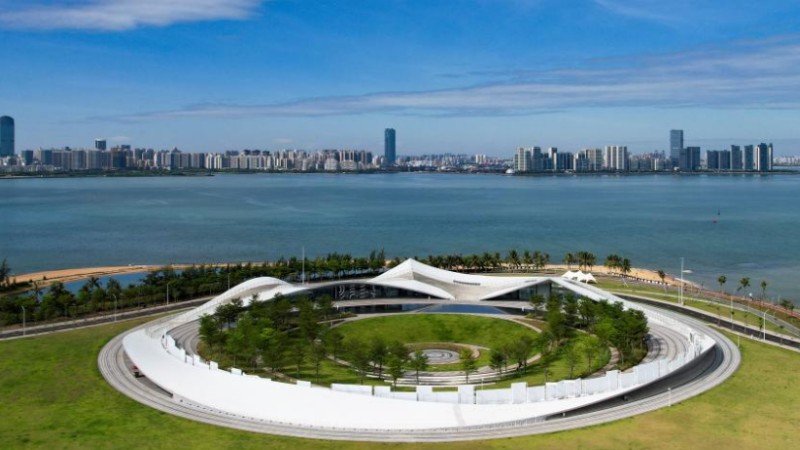Firm support voiced for drive to weed out healthcare corruption
Continuous oversight, reforms needed to achieve goals, experts and officials say
High hopes are held by experts and officials for China's yearlong drive against corruption in the healthcare sector, which is aimed at uprooting widespread misconduct, reducing medical expenses and fostering a healthy environment for the industry's development.
Prompt action taken at central and local levels to investigate and report a wide range of malpractices has demonstrated the determination to fight corruption, the experts and officials said. The campaign was launched early last month.
However, the experts and officials added that corruption in the healthcare sector is such a complicated and long-standing issue that continuous oversight and institutional reforms are needed to achieve the goals.
Ren Jianming, head of Beihang University's Center for Integrity Research and Education, said: "This round of the anti-corruption drive specifically targets the medical and pharmaceutical sector. The sole focus promises a tough and thorough crackdown."
A statement released by the National Health Commission on Tuesday said the campaign will investigate bribery and kickbacks in pharmaceutical sales, misuse of healthcare insurance funds, the ethics of medical personnel, use of power in exchange for money, and misconduct by industry associations and enterprises.
Ren said that in 2006, one round of a major anti-corruption campaign focused on curtailing irregular pricing mechanisms, such as charging excessive fees for medical services and drugs.
"But that round primarily targeted the business sector, so the impact on healthcare was relatively limited," he said.
"Recent crackdown efforts have pledged a comprehensive investigation to directly confront corrupt acts in the healthcare sector. I look forward very much to the outcome."
Ren added that involvement of the nation's top anti-graft authorities — the Communist Party of China Central Commission for Discipline Inspection, or CCDI, and the National Supervisory Commission — has further injected momentum into the campaign.
On July 28, the CCDI held a video conference to request intensified supervision and enforcement of disciplines and laws for the anti-corruption drive.
"Although the National Health Commission, as the top health authority, is able to enforce management and disciplinary action, the role of the CCDI in fighting corruption is irreplaceable," Ren said.
Figures compiled by media outlet Shangyou News show the number of hospital heads placed under investigation has risen rapidly since last month, with the total to date reaching more than 180.
"The speed at which local governments carried out probes, and the severity of penalties meted out, are impressive," Ren said.
Hu Xiaodong, a professor at China University of Political Science and Law's School of Political Science and Public Administration, said that over the years, most anti-corruption drives in the healthcare sector have centered on wrongdoing involving kickbacks given by pharmaceutical companies to doctors, and gifts from patients to doctors.
"But the scope of this latest investigation extends to hospital heads, heads of clinic departments, and administrative officials. The form of corruption being investigated is also more varied," he said.
The National Health Commission said the entire industry chain of production, logistics, sales, use and reimbursement will be rectified, and all shareholders, from administrators and associations to medical institutions, enterprises and healthcare insurers, will be examined.
Price rises
Corruption in the healthcare industry causes harm to individual patients and impedes the implementation of Healthy China 2030, a strategy to improve the overall health of the population, experts said.
"A normal procurement contract tends to determine the final price at 10 to 20 percent higher than the benchmark pricing (usually the industry average), but in the healthcare sector, the procurement price could rise by more than 10 times in some extreme cases," Ren said.
Selling products at high prices is a common malpractice among pharmaceutical suppliers. These vastly inflated prices enable them to bribe hospital staff members.
Hu said a typical case was revealed by anti-corruption authorities in Guangdong province on Aug 1.
Luo Yong, president of a hospital in the province's Zhongshan city, was found to have accepted cash and gifts from patients and colluded with suppliers and medical representatives to take kickbacks.
A report on the Guangdong Provincial Commission for Discipline Inspection's website said: "The total amount involved in the case reached 29.80 million yuan ($4.1 million). The kickbacks going into his (Luo's) pocket were turned into medical expenditure charged to patients."
The report said that after Luo was removed from his post in November, procurement costs and medical fees at the hospital dropped significantly.
"From January to May, the average cost for an outpatient visit there fell by 16.6 percent and the cost of each hospitalization decreased by 21.4 percent," the report said.
Hu said, "This case shows how corrupt acts can drive up expenses shouldered by patients — impacting people's sense of happiness, satisfaction and security in society."
Under pressure
Experts said hospitals facing financial pressure amid intense competition, and unbridled decision-making power in the hands of hospital administrators have led to severe cases of corruption.
Li Ling, a professor at Peking University's National School of Development, said public hospitals in China are under pressure to be self-reliant in generating revenue and funding about 90 percent of their operating costs. Government finances often only cover 10 percent.
"If a hospital pays lower wages than its competitors, its medical workers might be poached. Such competition between hospitals also motivates them to create higher revenues," Li told news portal Economic View.
Hu said: "Retaining skilled healthcare workers and purchasing high-end equipment cost enormous amounts of money, but the funds provided by governments are limited. With marketization of the medical field, hospitals are easily lured into choosing suppliers that offer additional benefits."
He added that two groups are the most likely to commit offenses — hospital administrators who have the power to allocate resources, and doctors who write prescriptions and devise treatment plans.
In a case that was revealed by the CCDI in May and which attracted public attention this month, a hospital in Pu'er, Yunnan province, bought a medical linear accelerator used for cancer radiation therapy for 35.2 million yuan, more than double the average market price of 15 million yuan.
The hospital's president, surnamed Yang, had a long history of dining out with and accepting gifts from suppliers. Even though his colleagues were opposed to purchasing the expensive equipment, which would be of limited use at the small hospital, Yang insisted on buying it for personal gain.
He received more than 16 million yuan in kickbacks.
"There is insufficient supervision of hospital administrators and oversight of market prices," Hu said.
Complicated issue
In its statement, the National Health Commission said that in addition to clamping down on corruption, the campaign is aimed at fostering a "clean and clear" industry culture and boosting high-quality development of the healthcare sector.
Hu said medical corruption is an extremely complicated issue. Despite challenges, the campaign should be enforced firmly, as it also presents an opportunity to rebuild doctor-patient relationships and reform drug procurement systems.
"It is essential to mobilize hospitals to return to the function of saving lives and treating people's ailments as public welfare, rather than being driven by making profits," he said.
"Governments, charity organizations and foundations can join efforts to step up investment to hospitals (to ease financial pressure)."
Hu also suggested imposing stricter oversight of key shareholders, such as hospital heads, department heads and doctors, to ensure that their priority is to enhance medical skills and address illnesses, instead of maximizing income.
"It is also important to increase bonuses and housing subsidies for medical workers while nurturing a healthy ethical culture among them," he said.
Hu added that more rules and regulations should be introduced to standardize drug procurement and sales procedures, and pricing mechanisms for medical products.
"More funds should be invested to support enterprises making basic medications that have a slim profit margin. In the meantime, favorable policies can be rolled out to support manufacturers creating more costly and advanced drugs for patients in need," he said.
Important role
The anti-corruption campaign has triggered a discussion on potential disruptions to normal medical order and academic activities.
Sun Ningling, a cardiovascular medicine specialist at Peking University People's Hospital, said she resolutely supports anti-corruption efforts, but objects to blindly stigmatizing all academic conferences.
"Academic meetings provide a platform for doctors to exchange knowledge, discuss complicated cases, and play an important role in improving our skills. When governments cannot fund these events, it is legitimate for medical associations and enterprises to provide sponsorship," she said.
However, some local campaigns have labeled sponsorship offered to academic conferences by industry associations as a form of corruption, she added.
Responding directly to the concern, the National Health Commission said on Tuesday that academic conferences and activities that abide by regulations should be supported and encouraged, but practices that use fake academic meetings to cover up the illegal transfer of benefits and division of sponsorship fees should be rectified.
Ren, from Beihang University, said that as a result of the campaign in 2006, a large number of medical experts were detained, interrogated and had their licenses revoked.
Many patients who waited for as long as two years to obtain an appointment with these experts were left disappointed.
"The campaign now underway should forcefully root out all existing cases, and avoid being stretched over a prolonged period that might disrupt the regular operation of hospitals," he said.
"It takes determination as well as a wise strategy to weed out corruption."
Timeline
Details of China's anti-corruption efforts targeting the healthcare sector this year:
Jan 9: The nation's top anti-graft body calls for a heightened crackdown on corruption that directly harms people's interests, such as those working in education, healthcare, social security, and care for the elderly. The decision is announced in a work report delivered at the second plenary session of the 20th CPC Central Commission for Discipline Inspection, or CCDI.
May 10: The National Health Commission says it will focus on addressing prominent corruption issues in healthcare and the pharmaceutical industry in the rectification campaign this year. The number of ministries taking part in the annual campaign rises from nine in previous years to 14.
Early July: Ten government departments, including the CCDI, issue documents clarifying goals and tasks for the yearlong anti-corruption campaign targeting procurement and sales of pharmaceuticals, and provision of medical services.
July 12: A video conference is held by the 10 government departments to launch the campaign nationwide. More than 4,000 officials across the country attend the online meeting.
July 25: A draft amendment to the Criminal Law submitted to the top legislature for review states that offering bribes in the food, drug, education and healthcare sectors should be harshly punished.
July 28: The CCDI holds a video conference, calling for stronger efforts to be made in the fight against corruption in the health industry. The commission launches an online platform to seek opinions from the public on the culture of the medical industry.
August: Local authorities release their plans for rectification campaigns. Some regions set up hotlines to receive reports from the public on corruption issues in the healthcare sector. The rectification campaign will last through June next year.
Sources: National Health Commission, Communist Party of China Central Commission for Discipline Inspection
Photos
Related Stories
- Telemedicine services cover all Chinese cities
- China lays out tasks for deepening reform of medical, healthcare systems in H2
- Digital technology used in health care in China's Guizhou
- Interview: China plays unique role in global healthcare, says senior official of Int'l Red Cross Committee
- Special health zone becomes medical vanguard in south China
- China improves world's largest basic healthcare network
- 2nd Int'l Healthcare Week held to showcase HK's strengths in healthcare innovation, investment
- China to boost digital healthcare services further
- China improves rural public health system amid policy support
- Tibet autonomous region sees continuous improvement in primary-level healthcare services
Copyright © 2023 People's Daily Online. All Rights Reserved.









